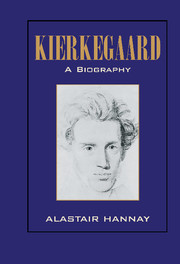Book contents
- Frontmatter
- Contents
- Preface
- Acknowledgements
- 1 From Street to Salon: First Blood
- 2 The Matter with Søren
- 3 A Faustian Phase
- 4 The Wild Geese Fly
- 5 The Dead and the Living: Debut
- 6 Serious about Irony: The Dissertation
- 7 The Breach and Berlin: Either/Or
- 8 Faith and Tragic Heroism
- 9 More to Being
- 10 Notabene's Meditation
- 11 Completing the Stages
- 12 Concluding Business
- 13 Reviewing the Age
- 14 Refashioning the Exterior
- 15 Works of Love
- 16 Defining the Deed
- 17 Mischievous Martyr
- 18 ‘Poor Kierkegaard’?
- Notes
- Index
16 - Defining the Deed
Published online by Cambridge University Press: 30 July 2009
- Frontmatter
- Contents
- Preface
- Acknowledgements
- 1 From Street to Salon: First Blood
- 2 The Matter with Søren
- 3 A Faustian Phase
- 4 The Wild Geese Fly
- 5 The Dead and the Living: Debut
- 6 Serious about Irony: The Dissertation
- 7 The Breach and Berlin: Either/Or
- 8 Faith and Tragic Heroism
- 9 More to Being
- 10 Notabene's Meditation
- 11 Completing the Stages
- 12 Concluding Business
- 13 Reviewing the Age
- 14 Refashioning the Exterior
- 15 Works of Love
- 16 Defining the Deed
- 17 Mischievous Martyr
- 18 ‘Poor Kierkegaard’?
- Notes
- Index
Summary
Kierkegaard had acquired copies of Adler's works in the summer of 1846, immediately on their publication. The statement from the bookseller is dated 12 June, almost a month after his return from that short trip to Berlin. Were it not for the fact that Adler had already presented Kierkegaard in 1843 with a dedicatory copy of the Sermons with that revealing Preface, that could weaken the surmise that it was Adler he was writing on when Brøchner visited him there. In any case, with Works of Love behind him, Kierkegaard now began to draft a large-scale work on Adler. By 1 December 1847, after many drafts and partial expositions, he had written and ‘rearranged’ two hundred pages. But then, on the pretext of avoiding a ‘cockfight’ between himself and the defenceless Adler on this ‘minor’ affair, just for the amusement of ‘an inquisitive public’, he chose in the end to publish – though not until 1849 – a mere summary with all references to Adler expunged, ‘On the Difference Between a Genius and an Apostle’ (Om Forskjellen mellem et Genie og en Apostel). There he says that apostles are not born, but are called by God to ‘proclaim the doctrine and use authority’. Kierkegaard is quite sure he is not that: ‘Good God, instead of helping to honour Christianity I would have ruined it.’ As a genius he might, however, try to exemplify it.
Information
- Type
- Chapter
- Information
- Kierkegaard: A Biography , pp. 369 - 386Publisher: Cambridge University PressPrint publication year: 2001
